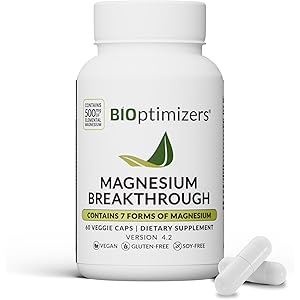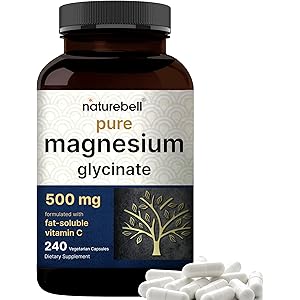BIOptimizers Magnesium Breakthrough Complex Supplement with 7 Forms of Mg: Glycinate, Malate, Citrate, and More - Natural Support for Sleep and Cognitive Function - 60 Capsules- Calming Vitamins
$39.95 (as of October 25, 2025 06:13 GMT +00:00 - More infoProduct prices and availability are accurate as of the date/time indicated and are subject to change. Any price and availability information displayed on [relevant Amazon Site(s), as applicable] at the time of purchase will apply to the purchase of this product.)What is an Autoimmune Protocol Diet?
The autoimmune protocol diet, often abbreviated as AIP, is a dietary approach designed to help individuals with autoimmune diseases manage their symptoms and improve their overall health. This diet focuses on eliminating foods that may trigger inflammation and immune responses, allowing the body to heal and restore balance. By understanding the core principles of the AIP diet, individuals can make informed choices about their nutrition and lifestyle.
The Core Principles of AIP
The AIP diet is built on two main principles: elimination and reintroduction. Initially, individuals eliminate a wide range of foods that are known to cause inflammation, such as grains, legumes, dairy, refined sugars, and processed foods. This phase allows the body to detoxify and reduce inflammation. After a period of strict adherence, individuals can gradually reintroduce foods one at a time to identify any potential triggers.
Foods to Avoid on the AIP Diet
When following the autoimmune protocol diet, certain food groups are strictly avoided. These include grains like wheat and rice, legumes such as beans and lentils, dairy products, refined sugars, and processed foods. Additionally, nightshade vegetables like tomatoes, potatoes, and eggplants are also eliminated due to their potential to provoke inflammation in sensitive individuals. Understanding these restrictions is crucial for successfully navigating the AIP diet.
Foods to Include on the AIP Diet
While the AIP diet restricts many foods, it emphasizes the consumption of nutrient-dense options. Individuals are encouraged to eat a variety of vegetables, particularly leafy greens, cruciferous vegetables, and root vegetables. High-quality proteins such as grass-fed meats, wild-caught fish, and organ meats are also staples. Healthy fats from sources like avocados, olive oil, and coconut oil play a vital role in supporting overall health during the AIP journey.
The Role of Nutrient Density
Nutrient density is a key concept in the autoimmune protocol diet. The focus is not just on avoiding harmful foods but also on maximizing the intake of vitamins, minerals, and antioxidants. Foods rich in nutrients support the immune system and promote healing. By prioritizing nutrient-dense foods, individuals on the AIP diet can help restore their health and vitality while minimizing the risk of nutrient deficiencies.
Understanding Inflammation and Autoimmunity
Inflammation is a natural response of the immune system, but in individuals with autoimmune diseases, this response can become dysregulated. The AIP diet aims to reduce systemic inflammation by eliminating potential dietary triggers. By understanding the relationship between diet, inflammation, and autoimmunity, individuals can take proactive steps to manage their health and improve their quality of life.
The Importance of Gut Health
Gut health plays a significant role in the autoimmune protocol diet. A healthy gut microbiome is essential for proper immune function and overall well-being. The AIP diet encourages the consumption of fermented foods, bone broth, and prebiotic-rich vegetables to support gut health. By fostering a balanced gut microbiome, individuals may experience reduced inflammation and improved immune responses.
Challenges of the AIP Diet
While the autoimmune protocol diet can be beneficial, it also presents challenges. The restrictive nature of the diet may make social situations and dining out difficult. Additionally, individuals may experience cravings for eliminated foods, leading to feelings of deprivation. It is essential to approach the AIP diet with a positive mindset and seek support from communities or professionals who understand the journey.
Monitoring Progress on the AIP Diet
Tracking progress is crucial for individuals on the autoimmune protocol diet. Keeping a food diary can help identify patterns and potential triggers during the reintroduction phase. Additionally, monitoring symptoms and overall well-being can provide valuable insights into the effectiveness of the diet. Regular check-ins with healthcare professionals can also support individuals in their AIP journey.
Conclusion: A Holistic Approach to Health
The autoimmune protocol diet is more than just a dietary plan; it represents a holistic approach to health and wellness. By focusing on nourishing the body and reducing inflammation, individuals can take charge of their health and work towards managing their autoimmune conditions. Embracing the principles of the AIP diet can lead to a more vibrant and fulfilling life.


